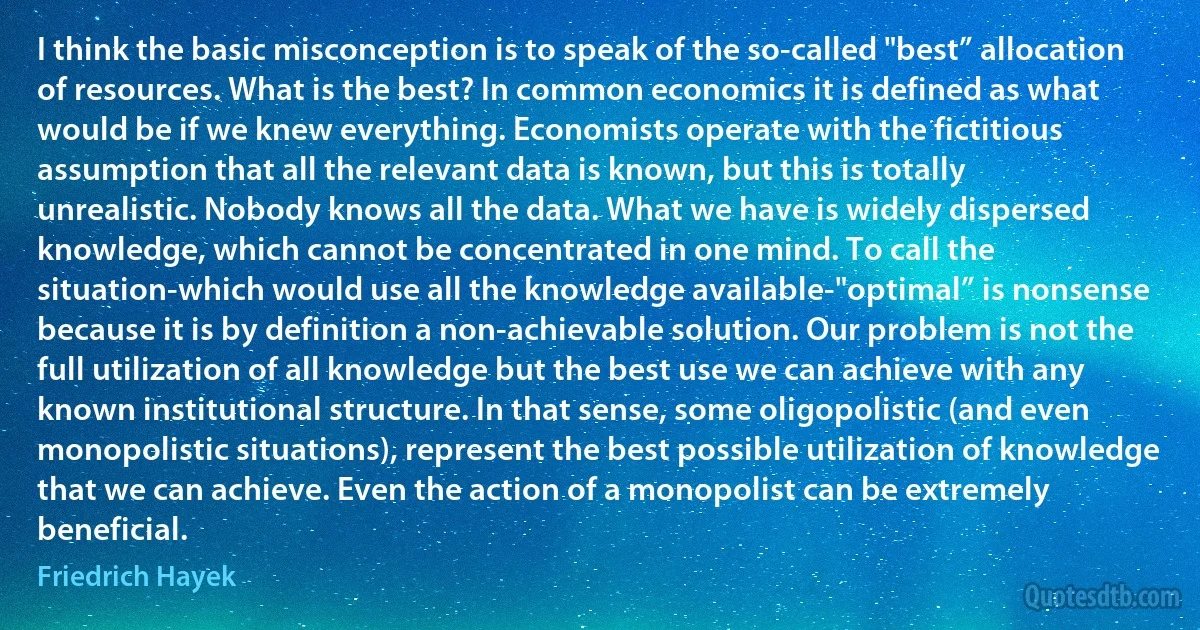
I think the basic misconception is to speak of the so-called "best” allocation of resources. What is the best? In common economics it is defined as what would be if we knew everything. Economists operate with the fictitious assumption that all the relevant data is known, but this is totally unrealistic. Nobody knows all the data. What we have is widely dispersed knowledge, which cannot be concentrated in one mind. To call the situation-which would use all the knowledge available-"optimal” is nonsense because it is by definition a non-achievable solution. Our problem is not the full utilization of all knowledge but the best use we can achieve with any known institutional structure. In that sense, some oligopolistic (and even monopolistic situations), represent the best possible utilization of knowledge that we can achieve. Even the action of a monopolist can be extremely beneficial.
Friedrich HayekRelated topics
action allocation assumption basic best call common datum definition economics everything full known knowledge mind misconception monopolist nobody possible problem sense speak think use utilization optimalRelated quotes
I believe that the world is totally connected: that is to say, that there are no events anywhere in the universe which are not tied to every other event in the universe. ...It is... an essential part of the methodology of science to divide the world for any experiment into... relevant and... irrelevant. We make a cut. We put the experiment... into a box. ...the moment we do that, we do violence to the connections ...I get a set of answers which I try to decode in this context. ...I am certainly not going to get the world right, because the basic assumption that I have made about the world is a lie. ...it is bound to give me only an approximation to what goes inside the fence. Therefore, when we practice science (and this is true of all our experience) we are always decoding a part of nature which is not complete. We simply cannot get out of our own finiteness.

Jacob Bronowski
The paper develops a new theory for the analysis of games with incomplete information where the players are uncertain about some important parameters of the game situation, such as the payoff functions, the strategies available to various players, the information other players have about the game, etc. However, each player has a subjective probability distribution over the alternative possibilities.
In most of the paper it is assumed that these probability distributions entertained by the different players are mutually "consistent," in the sense that they can be regarded as conditional probability distributions derived from a certain "basic probability distribution" over the parameters unknown to the various players. But later the theory is extended also to cases where the different players' subjective probability distributions fail to satisfy this consistency assumption.

John Harsanyi
We realized in our hearts that we could not do much till conditions were radically changed-hence our overwhelming desire for independence-and yet the passion for progress filled us and the wish to emulate other countries which had gone so far ahead in many ways. We thought of the United States of America and even of some eastern countries which were forging ahead. But most of all we had the example of the Soviet Union which in two brief decades, full of war and civil strife and in the face of what appeared to be insurmountable difficulties, had made tremendous progress. Some were attracted to communism, others were not, but all were fascinated by the advance of the Soviet Union in education and culture and medical care and physical fitness and in the solution of the problem of nationalities-by the amazing and prodigious effort to create a new world out of the dregs of the old.

Jawaharlal Nehru
The hangover theory, then, turns out to be intellectually incoherent; nobody has managed to explain why bad investments in the past require the unemployment of good workers in the present. Yet the theory has powerful emotional appeal. Usually that appeal is strongest for conservatives, who can't stand the thought that positive action by governments (let alone-horrors!-printing money) can ever be a good idea. Some libertarians extol the Austrian theory, not because they have really thought that theory through, but because they feel the need for some prestigious alternative to the perceived statist implications of Keynesianism. And some people probably are attracted to Austrianism because they imagine that it devalues the intellectual pretensions of economics professors. But moderates and liberals are not immune to the theory's seductive charms-especially when it gives them a chance to lecture others on their failings.

Paul Krugman
Humans... entered the 'cognitive niche.' Remember the definition of intelligence from Chapter 2: using knowledge of how things work to attain goals in the face of obstacles. By learning which manipulations achieve which goals, humans have mastered the art of the surprise attack. They use novel, goal-oriented courses of action to overcome the Maginot Line defenses of other organisms, which can respond only over evolutionary time. The manipulations can be novel because human knowledge is not just couched in concrete instructions like 'how to catch a rabbit.' Humans analyze the world using intuitive theories of objects, forces, paths, places, manners, states, substances, hidden biochemical essences, and, for other animals and people, beliefs and desires.... People compose new knowledge and plans by mentally playing out combinatorial interactions among these laws in their mind's eye.

Steven Pinker
